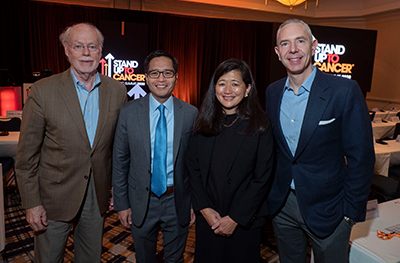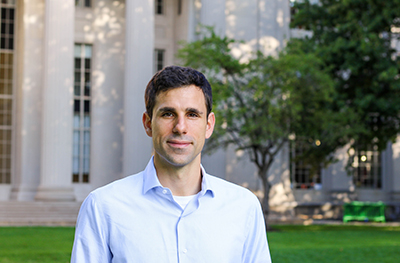Harsha Thirumurthy, PhD, associate director of Penn’s Center for Health Incentives & Behavioral Economics (CHIBE), and Alison Buttenheim, PhD, MBA, interim director of CHIBE, received a three-year, $3.5 million grant from the Bill and Melinda Gates Foundation to establish a first-of-its-kind, HIV-focused nudge unit in South Africa. The nudge unit will form partnerships with government and HIV services providers and test behavioral interventions to increase population-level coverage of HIV prevention services. Ending the world’s largest HIV epidemic will require higher utilization of HIV testing, prevention, and treatment. Buttenheim and Thirumurthy see a lot of potential for behavioral interventions to make a difference here.
The project will be led by CHIBE with a strong local partner, HE2RO (Health Economics and Epidemiology Research Office at Wits University in Johannesburg). Buttenheim and Thirumurthy will co-lead the initiative and say there will be opportunities for other researchers at Penn to get involved, as well. The nudge unit is set to launch next year.
Frances E. Jensen, MD, chair of Neurology, joined the American Brain Foundation’s (ABF) board of directors in January. The Foundation promotes and invests in research across the whole spectrum of brain disease. The ABF touted Jensen’s leadership in the field of neurology to advance the ABF mission of bringing researchers and donors together to cure brain diseases and disorders.

Sandra Ryeom, PhD, an associate professor of Cancer Biology, is the co-leader of a team which received a $3 million Stand Up to Cancer (SU2C) grant to improve early detection in stomach cancer. Ryeom and the international team will receive the money over three years as they conduct intensive studies to identify biomarkers, such as particular bits of DNA and cells that are shed from the tumor that circulate in the blood system and indicate the presence of gastric cancer. The group will explore innovative techniques, including a tiny, pill-sized camera that can be swallowed by a patient and can provide detailed images of the lining of the stomach to identify abnormal areas that might be precancerous. If and when validated in clinical trials, the refined techniques will help doctors detect precancers in populations at high risk. The funding is supported by grants from the Cless Family Foundation and Sara & Jeff Schottenstein Family Charitable Fund.

César de la Fuente, PhD, an assistant professor in the departments of Psychiatry, Microbiology, and Bioengineering, was awarded the first Langer Prize for Innovation and Entrepreneurial Excellence by the American Institute of Chemical Engineers (AIChE). The fellowship is named for biomedical pioneer Robert Langer of the Massachusetts Institute of Technology. The Prize, which aims to support rising stars in the early stages of their careers, provides an unrestricted grant to enable creative researchers and engineering entrepreneurs to tackle high-risk, high-impact challenges with the potential of achieving game-changing innovations. De la Fuente received the Langer Prize on November 10 at the 2019 AIChE Annual Meeting in Orlando, FL.
Penn Medicine is one of the world’s leading academic medical centers, dedicated to the related missions of medical education, biomedical research, excellence in patient care, and community service. The organization consists of the University of Pennsylvania Health System and Penn’s Raymond and Ruth Perelman School of Medicine, founded in 1765 as the nation’s first medical school.
The Perelman School of Medicine is consistently among the nation's top recipients of funding from the National Institutes of Health, with $550 million awarded in the 2022 fiscal year. Home to a proud history of “firsts” in medicine, Penn Medicine teams have pioneered discoveries and innovations that have shaped modern medicine, including recent breakthroughs such as CAR T cell therapy for cancer and the mRNA technology used in COVID-19 vaccines.
The University of Pennsylvania Health System’s patient care facilities stretch from the Susquehanna River in Pennsylvania to the New Jersey shore. These include the Hospital of the University of Pennsylvania, Penn Presbyterian Medical Center, Chester County Hospital, Lancaster General Health, Penn Medicine Princeton Health, and Pennsylvania Hospital—the nation’s first hospital, founded in 1751. Additional facilities and enterprises include Good Shepherd Penn Partners, Penn Medicine at Home, Lancaster Behavioral Health Hospital, and Princeton House Behavioral Health, among others.
Penn Medicine is an $11.1 billion enterprise powered by more than 49,000 talented faculty and staff.